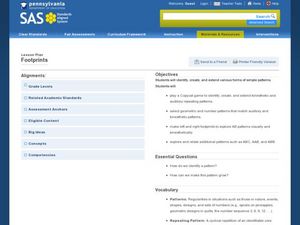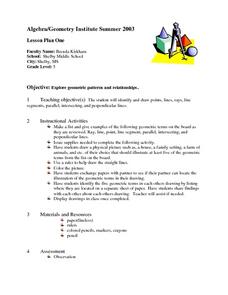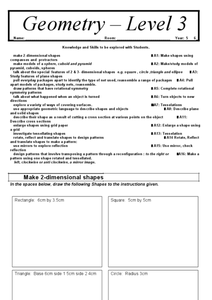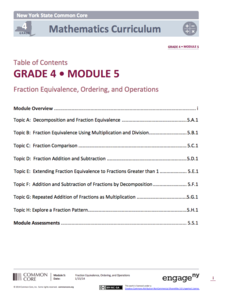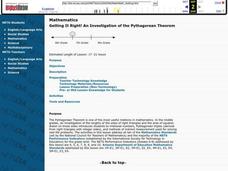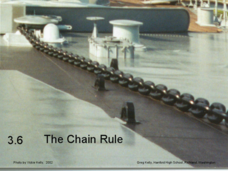Curated OER
Count By Two Worksheets
In these skip counting worksheets, students will complete the counting patterns by counting by 2's. For each number pattern, students must count by 2's a total of 8 consecutive times.
Curated OER
Can You Tell What the Hidden Message Is?
In this math patterns worksheet, young scholars use their problem solving skills to solve 6 problems that require them to complete messages by finding patterns.
Curated OER
Count on Me
Fourth graders use inductive reasoning to find algebraic patterns in geometric figures. They use technology (i.e., calculators, computers) and manipulatives to discover number patterns involving geometric concepts. They solve concrete...
Curated OER
Footprints
Students explore patterns. In this patterns geometry lesson, students identify and extend patterns including body parts, movement, geometric shapes, noises, and footprints. Students create and share an original pattern.
Curated OER
Challenge: Zero Patterns
In this multiplication worksheet, students use mental math to solve 12 multiplication problems. Students find the product of 1 or 2 digit numbers multiplied by 2 or 3 digit numbers. Students use the multiplication pattern of counting...
Curated OER
Amazing Fibonacci
Students integrate the patterns of Fibonacci into music. In this geometry lesson plan, students apply the concepts of recursion, pattern and Phi or Golden Ratio to composing and playing music on various instruments. They lesson plan is...
Curated OER
All A-buzz About Math
Second graders participate in Math-Eze activities to comprehend word problems. In this word problem lesson, 2nd graders recognize why a hexagon is the best shape for a beehive. Students calculate how far bees must travel to find 2 lbs....
Curated OER
Patterns to the Rescue
Learners watch the Cyberchase episode, "The Poddleville Case" and play online games to examine how patterns are sequences that repeat or change in an orderly way. The lesson plan culminates with students creating their own patterns to...
Curated OER
Pattern Pete
Students identify patterns. In this pattern lesson plan students discuss what makes a pattern. They find a pattern hidden in the classroom.
Curated OER
Multiple Patterns
Second graders utilize a 1-100 grid to identify multiples of single digit numbers. They look for patterns and how they could be used to identify multiples to demonstrate the ability to use the multiplication facts and charts of single...
Curated OER
Repeating and Growing Patterns homework 6.5
In this continuing the pattern worksheet, students observe patterns, write the numbers, draw the next picture, and identify sequence as a repeating pattern or a growing pattern. Students write four answers.
Curated OER
Jelly Bean Math
Young scholars estimate, measure, compute, and create patterns using jelly beans. In small groups, they solve various calculations, place jelly beans into groups, invent a new flavor, create a pattern, and complete a worksheet.
Curated OER
Find a Pattern problem solving 6.6
In this finding a pattern using a table worksheet, students write what they know and need to find out, make a table to show a pattern, and solve the pattern sequence. Students write nine answers.
Curated OER
Investigation - Square Numbers and Triangle Numbers
Fifth graders investigate growth patterns using blocks. In this square and triangle numbers lesson, 5th graders predict sizes of larger triangles and squares based on numerical patterns they observed while building.
Curated OER
Missing Pattern Blocks
For this pattern blocks worksheet, students look for missing pattern blocks, record them in a graph, and then put them away. The graph contains a picture of each pattern block.
Curated OER
Dividing by Negative Powers of Ten (B): Single-Digit Facts
Students are prompted to divide single digit numbers by negative powers of ten in this straightforward worksheet. Prompted to divide ten numbers by 1, .1, .01, .001, and .0001, students can develop a pattern which will ease the...
Curated OER
Lesson Plan One: Points, Lines, Rays
Fifth graders explore basic geometric terms. Pupils draw a physical picture of a scene that illustrates at least five geometric terms. Partners exchange drawings and locate the illustration of geometric terms in the drawing.
Curated OER
Dividing by Negative Powers of Ten (C): Single-Digit Facts
Test your students' division skills with this patterned worksheet, where students are given 10 single-digit numbers which they are to divide by 1, .1, .01, .001, .0001. Once the procedure is understood, the answers are easy to calculate.
Curated OER
Geometry Level 3
What a wonderful resource! Learners create two-dimensional shapes according to the instructions stated, use the squares to make a triangular prism, a cube, and a pyramid, and identify features of plane shapes, among a myriad of other...
EngageNY
Fraction Equivalence, Ordering, and Operations
Need a unit to teach fractions to fourth graders? Look no further than this well-developed and thorough set of lessons that takes teachers through all steps of planning, implementing, and assessing their lessons. Divided into eight...
Curated OER
Getting It Right! An Investigation of the Pythagorean Theorem
Learners construct a variety of right triangles using a right-angled set square, cutting corners from pieces of paper or cardboard, and using dynamic geometry software. They measure the sides of these various right triangles and record...
Curated OER
Data Analysis Using Technology
Analyze data using technology. Middle schoolers design data investigations, describe data, and draw their own conclusions. Then they select the best type of graph, graph and interpret the data, and look for patterns in trends. They also...
Curated OER
Dice Games
Games and activities are wonderful for igniting interest in nearly any topic. With a pair of dice, your class will practice their basic math and social skills at the same time. Learners battle it out to see who can roll only odds or only...
Curated OER
Calculus 3.6 - The Chain Rule
Greg Kelly puts together another great slide presentation to demonstrate ways to combine derivative rules to evaluate more complicated functions. This pattern is called the chain rule. He shows step by step ways to solve these...





